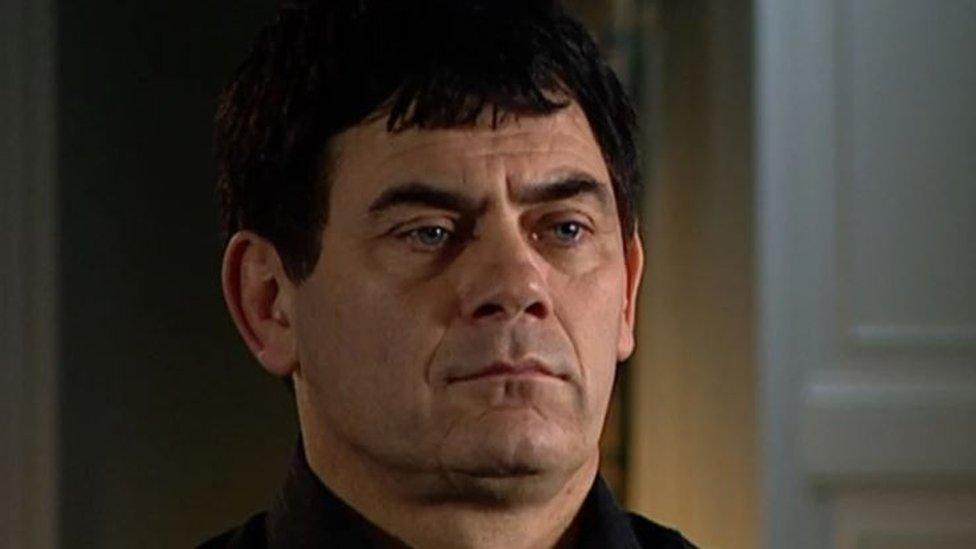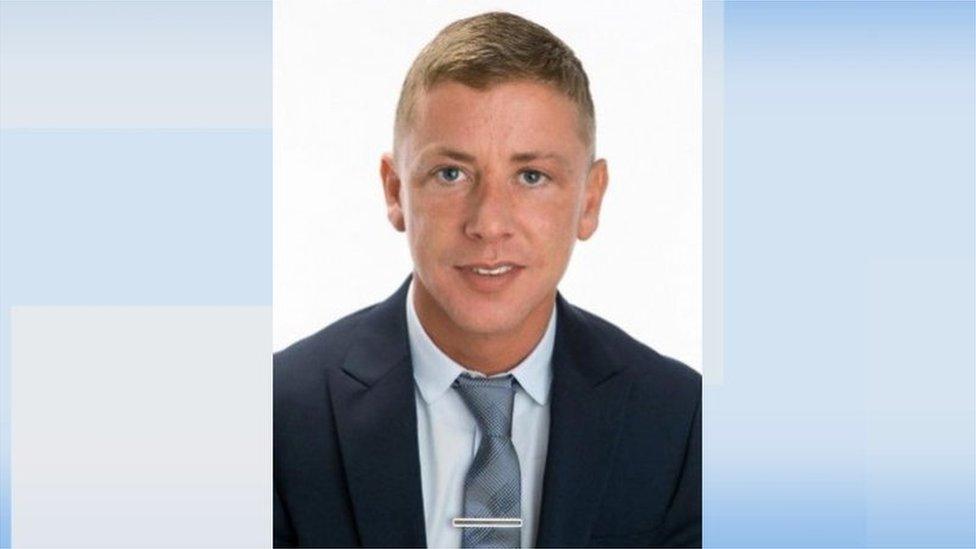Gerard Hutch trial: No evidence to link accused to murder, court told
- Published

Gerry Hutch has pleaded not guilty to the murder of David Byrne
There is no evidence apart from a statement by a former Sinn Féin councillor to link a man accused of murder to a key moment in the gangland crime, a court has heard.
A police officer agreed with the defence there "wasn't a scintilla of evidence", apart from his statement, that Jonathan Dowdall gave a hotel room key to Gerry Hutch.
The room was used by the murderers of David Byrne in 2016.
Gerry Hutch has denied murder.
David Byrne was killed during a boxing weigh-in at the Regency Airport Hotel in February 2016.
Det Sgt Patrick O'Toole is giving evidence in a trial within a trial at the Special Criminal Court in Dublin on the admissibility of Dowdall's evidence.
Dowdall pleaded guilty last month to facilitating the murder.
He had been due to go in trial for murder, along with Gerry Hutch, but is now expected to give evidence for the prosecution.
Lawyers for Gerry Hutch told the trial there was no evidence against their client other than Dowdall's "say so" that Gerry Hutch allegedly confessed to him that he was part of the murder team.

Jonathan Dowdall is a former Sinn Féin councillor
The three-judge non-jury court has heard gardaí (Irish police) secret recordings of conversations between Dowdall and Gerry Hutch in Dowdall's jeep.
Det Sgt O'Toole admitted Dowdall had told untruths in the recordings out of bravado "to impress Gerry" and because he was on medication for depression.
He said Dowdall wanted to mediate between the Hutches and their gangland rivals, the Kinahans, before and after the murder of David Byrne.
Det Sgt O'Toole repeated that Dowdall was in fear for his life at the time.
'I talk a lot when I'm nervous'
The court also heard that Dowdall told gardaí he had nothing to do with David Byrne's murder and that he was prepared to go into the witness box to defend himself.
That evidence was given by Det Cathal Connolly who took notes of conversations he had with Dowdall and his wife, Patricia.
In his garda statement, Dowdall said there were many lies in his secretly-recorded conversations with Gerry Hutch, the court heard.
Dowdall said he was trying to tell Gerry Hutch things he wanted to hear and because he was on tablets.
"I talk a lot when I'm nervous or uncomfortable," the former Sinn Féin councillor said.
He said he knew nothing about guns or the AK47s used by the killers. He added he didn't even know guns could be traced.
He said he was "ashamed" about comments he made about putting a bomb under a named person's mobile home in Wexford.
He also said he lied about shooting at an uncle's house.
'Tortoise-like' approach
Dowdall's solicitor had written to gardaí to say her client "was in no doubt he would be murdered" if word leaked that he was prepared to be a prosecution witness in the murder trial.
Jenny McGeever said the stress for him and his family was unbearable.
In the letter she criticised their "tortoise-like" approach to dealing with this matter.
Lead investigator Det Supt Joseph O'Loughlin told the court he became aware of intelligence that if Dowdall made a witness statement there would be a severe threat to the former Sinn Féin councillor and his family and an attack was likely.
He said it took a week to put in place measures to protect them.
Det Supt O'Loughlin also told the court it was his understanding that the Director of Public Prosecution's (DPP) decision to drop murder charges against Dowdall and the former Sinn Féin's councillor's decision to make a statement and be a prosecution witness were "not linked" and "not related".
He said it was his understanding that both decisions were separate even though he became aware of them on the same day.
The DPP decision cleared the path for Dowdall to be a prosecution witness.
Lawyers for Gerry Hutch put it to Det Supt O'Loughlin that it was "irrational, illogical and inconceivable" that the DPP's decision to drop the murder charge against Dowdall and his decision to make a witness statement were not linked.